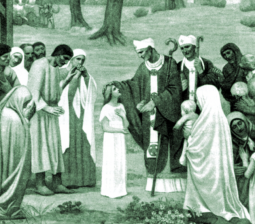Lives of the Saints
Our Models and Protectors
Spiritual Bouquet:
July 30

Saint Germanus
Bishop of Auxerre
(† 450)
Germanus, according to appearances, was not of outstanding piety during his youth, though of noble birth; his forebears were lords of the county of Auxerre in Gaul in the 5th century. He studied eloquence and civil law in Rome, and practiced law there with distinction. He married a Roman noblewoman and became known to the emperor Honorius, who made him general of the imperial troops for his native province.
Returning then to Auxerre, he indulged his passion for hunting, and when advised by Saint Amator, the bishop of Auxerre, that his habits were not edifying, paid no attention to the admonition. But God made known to this holy bishop his forthcoming death, and that Germanus was destined to succeed him. Saint Amator therefore went to see the Prefect of Gaul and asked his permission to have this soldier as a member of his clergy; and the permission was granted. He then tonsured Germanus and clothed him with the ecclesiastical habit, taking him by surprise during an assembly of the faithful, and informing him there that he was destined to be his successor. Germanus dared not resist, fearing to oppose the Will of God. He was consecrated soon afterwards, in the year 418.
He immediately became another man, and making over his lands to the Church, he adopted a life of humble penance. He rapidly attained high perfection, and the gift of miracles was given him. He attempted to conceal it, but it became known when he obliged the demon, during a public exorcism, to reveal the place where stolen money was concealed. Afterwards there was never a time when all the roads leading to his residence were not filled with crowds of sick persons, waiting to address the bishop and beg his assistance. Many possessed persons were also delivered. Invariably his modesty caused him to attribute the multiplying prodigies to the relics of Saints which he wore around his neck, or to the sign of the Cross, or to the holy water he sometimes used, or to oil which he blessed. The furious demons tormented him with temptations and terrifying apparitions, but found themselves powerless to disturb his peace.
At that time the Pelagian heresy was laying waste the British Isles, and Germanus was chosen by the reigning Pontiff to go and deliver the Britons from the snare of Satan. With Saint Lupus he preached in the fields and highways throughout the land. Eventually he met the heretics face to face in a public conference, where each party was given an opportunity to speak. When the heretics had defended their position, the two holy bishops answered with such force that their adversaries were reduced to silence, and the faithful rejoiced in the triumph of the Catholic faith. He also led the British people to their famous alleluia victory over the Saxons.
Germanus visited England a second time to combat the Pelagian heresy which was still sowing its errors. On this visit he established public schools in Great Britain, which afterwards alleviated the ignorance of the people and preserved them from error. He ordained priests and established an archbishop, and many Saints were formed in the schools which his successors continued to found. After pursuing his good works on behalf of the peoples of both his adopted and his native land, he died while in Italy, where he had succeeded in appeasing the anger of the emperor against some rebels in Britain. Miracles had accompanied him all along the route of his journey. His holy death occurred at Ravenna in the year 450, the 31st of his episcopal office.
Les Petits Bollandistes: Vies des Saints, by Msgr. Paul Guérin (Bloud et Barral: Paris, 1882), Vol. 9; Little Pictorial Lives of the Saints, a compilation based on Butler's Lives of the Saints, and other sources by John Gilmary Shea (Benziger Brothers: New York, 1894).